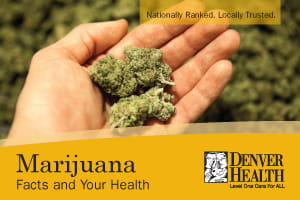Although retail marijuana is legal in Denver, concerns about its health effects still remain. Download a marijuana information sheet (Datos sobre la Marihuana y su salud) for some facts about marijuana and your health.
What is marijuana?
Marijuana is a greenish-gray mixture of the dried, shredded leaves, stems, seeds and flowers of cannabis sativa - the hemp plant. Most people smoke marijuana, though it can also be used in other forms such as edibles, powders and oils. There are more than 200 marijuana terms used in the United States. The most common are:
- Weed
- Bud
- Cheeba
- Chronic
- Dank
- Dope
- Grass
- Ganga
- Kine/Kind bud
- Kush
- Pot
- Schwag
- Skunk
Health effects of using retail marijuana
The active ingredient in marijuana is tetrahydrocannabinol (THC), which is the chemical responsible for most of marijuana's psychological effects. Within minutes of use, THC and the other substances in marijuana can cause short-term effects.
Signs and symptoms of marijuana use can be different for everyone. Some common signs include:
- Rapid heart rate
- Increased blood pressure
- Red eyes
- Dry mouth
- Increased appetite or "the munchies"
- Poor coordination
- Slowed reaction time
- Feeling "high"
Marijuana use among Denver youth
Marijuana use is common among Denver youth, ranking above the state and national averages. (28% of Denver high school students reported use within the past 30 days, compared to 22% in Colorado and 23% in the United States.)
Behind alcohol, marijuana continues to be the most used drug among Denver youth, with youth using marijuana more frequently than tobacco. The average age of first time use in Colorado is 14.
How does marijuana use affect the health of Denver youth?
The adolescent years represent a critical time for brain development. Research suggests that frequent use of marijuana during this time results in:
- Impaired learning
- Impaired memory
- Decreased IQ
Chronic marijuana use that begins in adolescence has been associated with up to an eight point reduction in adult IQ. Additionally, mood and anxiety disorders occur more frequently in individuals with marijuana use disorder. These conditions can include:
- Major depressive disorder
- Mania
- Anxiety disorders
According to the National Institute of Drug Abuse, younger people are showing decreased perception that marijuana is dangerous. Research shows that this will likely lead to more youth using marijuana and using it more often. Research also shows that one in six people who engage in marijuana use as a teen will develop an addiction to marijuana. Marijuana use increases dopamine, in the part of the brain that creates good feelings, or a "high". A user may feel the urge to smoke marijuana again and again, to re-create that experience. Repeated use could lead to addiction.
Denver Health offers mental health and addiction treatment for children, teens and adults. We offer the STEP program (substance abuse treatment education and prevention program), which provides outpatient, psychiatric and substance abuse to clients ages 12 - 24.
Marijuana exposure and pregnancy
Marijuana exposure during pregnancy is not recommended as it has been associated with:
- Cognitive and attention deficits
- Memory and learning problems
- Early onset of depression
- Substance use by early adolescence in children exposed in utero
- Decreased school achievement
According to the National Survey on Drug Use and Health, 4.6% of pregnant women reported past month marijuana use during their first trimester. Furthermore, adolescent mothers are more likely to use substances (like marijuana) before, during and after their pregnancy compared to other adolescent females. Consult your doctor if you are pregnant and have questions about marijuana use.
Other marijuana health resources
- City of Denver
- Colorado Department of Public Health and Environment
- National Institute on Drug Abuse
- National Institute on Drug Abuse: Teens
- Seattle, King County Public Health
- Understand the Big Deal: How marijuana harms youth
- Understand the Big Deal: How marijuana harms youth_2
- University of Washington Alcohol & Drug Abuse Institute



